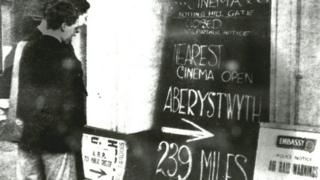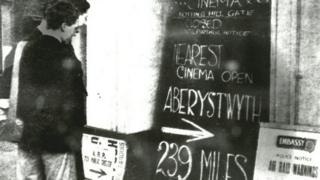Aberystwyth: The town where cinemas stayed open as WW2 began
It earned the distinction of being the only town in Britain to have a cinema open in September 1939. …

 Image copyright Ceredigion Museum
Image copyright Ceredigion Museum Not usually known as a seat of rebellion, Aberystwyth was the only town to defy the government and have cinemas open at the outbreak of World War Two.
In the first week of the conflict in September 1939, all places of entertainment were closed on the orders of the Home Office.
But from 4 to 8 September, Aberystwyth was the only town in Great Britain to ignore this and have cinemas open.
This led to a government climb down with all venues open by the weekend.
It was on 3 September 1939 that Great Britain declared war on Germany after it ignored an ultimatum to cease its invasion of Poland.
Following this, the Home Office declared that all places of entertainment should be closed down “until the scale of the attack is judged”.
Writing in The Times on 5 September, George Bernard Shaw called it “a masterstroke of unimaginative stupidity”.
Despite this verdict, all venues in Britain adhered to the directive – all apart from those in Aberystwyth.
“The Second World War broke out on 3 September which was a Sunday when most cinemas were normally closed,” said Ceredigion Museum’s former curator Michael Freeman.
“On the second day all cinemas remained closed except for one, the Pier Pavilion cinema, Aberystwyth, which was due to show The Mad Miss Manton with Barbara Stanwyck and Henry Fonda.
“On the fourth day of war, the Coliseum, Aberystwyth opened, having obtained delivery of its films.”
The town’s third cinema, the Forum on Bath Street, was undergoing renovation.
A report about the cinemas remaining open in the Cambrian News said: “Both had received permission from the chief constable provided that they had someone listening for the air raid siren.
“Special notices about the risks during an air raid were placed in the cinemas.”
While the chief constable of Cardiganshire JJ Lloyd Williams said he used his “discretionary powers” and declared “all places of entertainment are now available to the public”, this brought an angry response.
“The Home Office states that neither the chief constable nor anybody else has the power to open a theatre or cinema without Home Office permission,” it said in a statement.
“They are closed under Home Office orders and that is rigid.”
While the Pier Cinema was closed on the Thursday, the town’s other two opened, meaning it was still the only British town where films were being shown.
By the Saturday, the Home Office’s resistance had waned and it sanctioned all venues in “neutral areas” – those not in areas in danger of being bombed – opening until 22:00.
This was on the proviso a member of staff would be posted to listen for air raid warnings.
But while the government could not close the Pier Cinema down, it was its position near the coast which eventually led to it having to shut its doors.
Exploding mines
“[It] was closed from the 1 October 1941 until 1 April 1942, because of the concern that mines in the Irish Sea might blow it up,” Mr Freeman said.
“A mine did explode near it in October 1942 and as a result, the pier was closed from then on, presumably until the end of the war.”
A report written by the chief constable and kept at the Ceredigion Archives described sea mines washing up between Llanon and the Dyfi Estuary.
“In consequence of the danger existing from such mines, a notice prohibiting the use of the Aberystwyth Pier and cinema was issued by myself on the instruction of the naval authorities,” it said.
The Pier Cinema eventually reopened, but in 1960, it was damaged by fire and closed, never to show a film again.




